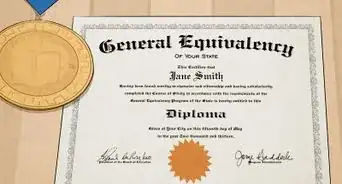This article was co-authored by Alexander Ruiz, M.Ed.. Alexander Ruiz is an Educational Consultant and the Educational Director of Link Educational Institute, a tutoring business based in Claremont, California that provides customizable educational plans, subject and test prep tutoring, and college application consulting. With over a decade and a half of experience in the education industry, Alexander coaches students to increase their self-awareness and emotional intelligence while achieving skills and the goal of achieving skills and higher education. He holds a BA in Psychology from Florida International University and an MA in Education from Georgia Southern University.
This article has been viewed 61,534 times.
Setting goals can help you stay on top of your studies and earn good grades, but it's important to set the right kinds of goals. Setting unrealistic goals could set you up for disappointment and frustration, while setting goals that are too easy will not challenge you to your full potential. That's where S.M.A.R.T. (Specific, Measurable, Action-oriented, Realistic, Time-bound) goals can help. Learning how to create and work towards attainable goals can help you succeed in school and in life.
Steps
Setting Yourself up for Success
-
1Determine what type of goal you want to set. There are many possible goals you could set, but the type of goal refers to how you'll measure your progress and success. The two main types are process goals and outcome goals.
- Process goals focus on the work that you'll do within a given time period. An example of a process goal would be to complete and submit all of your assignments on time this week.
- Outcome goals focus on the results of your work. An example of an outcome goal would be to earn a grade of at least 90% on your next test.
-
2Identify the reasons why your goal is important. Having a goal may not be enough to keep you motivated. If that's the case, it may be important to remind yourself of why that goal is meaningful to you, and why you hope to achieve it. Reflecting on the outcome of that goal - both the positive results if you succeed and the negative results if you don't - may help you stay more focused and driven over time.[1]
- Do you need to do well in a class to pass? Are you trying to improve your grades overall?
- Perhaps you want to do well in a class so that you can eventually seek employment in a related field. If this is the case, you'll want to learn as much as possible in that class.
Advertisement -
3Set up a reward system to stay motivated. Some people work best when they know there is some type of reward to be had. Having a self-imposed reward system helps you stay motivated and track your progress so you'll know whether or not you deserve your "treat" for the day, week, month, or semester.[2]
- Consider setting incremental rewards. Set smaller rewards for minor mile markers and bigger rewards for accomplishing the hardest parts of your goal. Imagine climbing a set of stairs. Each stair is a mini-goal that essentially leads you to the main goal at the top.
- Decide on some type of reinforcer that will help you stay motivated. It can be a favorite snack, an event you want to go to, a physical object you'd like to buy, or even a vacation or time off from your normal schedule.
- Use that reward to motivate you. Agree in advance that you won't get to enjoy your reward unless you accomplish your goal.[3]
- Consider asking a close friend to either help you stay motivated or prevent you from indulging in your reward without success.
Setting a SMART Goal
-
1Make your goal as specific as possible. Having a vaguely-defined goal can make it difficult to follow through on your efforts and track your progress. However, having a clear, well-defined goal will help you stay driven and know how far you've come.[4]
- Your goal should be as clear and actionable as possible.
- Remember to focus on either a process goal or an outcome goal. Keep in mind, though, that you can work toward multiple goals at once. For instance, you might have an outcome goal of getting an “A” in English, and process goals along the way that help you earn that “A.”
- For example, instead of just saying your goal is to get through your math class, figure out what you hope to accomplish. Do you want to become more proficient in math (a process goal), or earn a good grade (an outcome goal)?
-
2Ensure that your progress is measurable. Whenever you set a goal for yourself, it's important to recognize how you've progressed in working towards it. That's why you should always set goals with clear, measurable progress marks and keep track of your efforts every step of the way.[5]
- Determine in advance how you will measure success. Ask yourself, "How will I know when I've accomplished my goal?"
- You can mark off successes when you reach checkpoints along the way. You can even use a reward system.
- Choose both short-term and long-term measures of success.
- For example, you might measure success in the short-term by looking at how much studying and homework you get done in a week, and in the long-term by watching how your grades improve over the course of the semester.
-
3Decide on action-oriented steps to accomplish your goal. Even a good, well-defined goal could be difficult to achieve without a clear action plan. When you set your goal, make sure you include action-oriented steps as part of your goal development. That way you'll know what you're trying to accomplish and, more importantly, how you'll get there.[6]
- Be very clear in how you intend to achieve your goal.
- Having action-oriented steps means developing clear guidelines that lay out what (specifically) you will need to do at every step along the way.
- Think about the steps your goal will require, both in the short-term and in the long-term.
- Focus on what specifically you will need to do.
- For example, action-oriented steps might include completing your homework ahead of time, reviewing your notes every day after class, and arranging a meeting with your instructor.
-
4Make sure your goal is realistic. It's important to dream big, but it's also important to know what you can realistically accomplish with the materials you currently possess and the time frame you're given. Don't bite off more than you can chew, but at the same time don't give yourself a task that's too easy.[7]
- An example of a realistic goal would be to improve your course grade by one letter before the end of the semester. An unrealistic goal, by comparison, would be to turn an F into an A by the end of the semester.
- Be aware of what could potentially hinder your success and plan accordingly so that these obstacles do not impede your progress towards accomplishing your goal.
- For instance, if your goal is to get a good grade on an essay, you’ll want to be aware of other assignments that could affect the amount of time you spend working on the essay.
-
5Give yourself a reasonable time frame. If you're working within a school calendar, the end of that semester might be the end of your time frame. However, there's still plenty of flexibility in terms of what can be done and when it needs to be done by.[8]
- Decide in advance when your goal needs to be accomplished.
- Once you have a firm deadline, work your way backwards to determine when you need to begin your work and when various milestones along the way must be met.
- For example, if you're working within the time frame of a semester, you might decide that you'll accomplish your goal before finals week. That means working backwards to figure out what needs to be completed and when.
Working Towards Your Goal
-
1Be aware of your deadlines. A well-planned, SMART goal is meaningless if you don't keep track of your deadlines and do the necessary work along the way. You'll need to put in a lot of effort if you hope to accomplish that goal, but with proper planning, you should be able to balance that work very comfortably.[9]
- If you have a longer timeframe, be sure to schedule checkpoints along the way. If you want to improve your grade, find out how to monitor your progress, such as by paying attention to progress reports and assignment grades.
- Schedule your work time and your deadline on your calendar. Get into the habit of setting aside work and study time each day and sticking to your routine.
- Remove distractions, or remove yourself from distracting situations. If you can't work at home (or in your dorm room) due to distractions there, study in the library and keep your phone turned off.
- Let your friends know that you may not be available as much for social events while you work to meet your deadlines. You'll need to avoid temptation by simply avoiding those social events altogether that would interrupt your studies.
-
2Identify any potential obstacles. Even the best of plans are susceptible to pitfalls along the way. Most of the potential obstacles you'll face are likely of your own creation, but by being aware of them in advance you can reduce the risk of failure.[10]
- Some common obstacles to school success include conflicting deadlines, extracurricular activities, spending too much time with friends, and distractions like TV, the internet, and video games.
- Set limits for yourself. It's okay to spend some time doing fun things, but you have to balance work and play time.
- For example, you might decide that you'll allow yourself 30 minutes of video games or an hour with friends, but only after two hours of studying.
- Once you've identified the potential obstacles to your success, you can work around them accordingly on your own schedule.
-
3Triage your work. Sometimes it makes the most sense to start your work where it's easiest. However, if you're worried about budgeting your time, you may find it helpful to focus on the most difficult or time-consuming tasks first, rather than saving them for last. Alternatively, you might want to get easier assignments out of the way first in order to reduce your stress. Just make sure to allot enough time to finish the more demanding tasks.[11]
- The difficult parts of an assignment may require additional periodicals, assistance from an instructor, and other resources that could be difficult to attain on short notice.
- In addition to doing the difficult work up front, you should also be aware of any assignments that build off of other assignments. These may require you to complete other work before moving on to that assignment.
- Remember that the more time you give yourself, the easier it will be to get your most difficult work done on time.
-
4Find support from friends, family, and teachers. Having support can make a huge difference in your success rate. Not only will the people in your support network help you stay motivated, they can also celebrate with you once you've accomplished your goal.[12]
- Once you've identified people who can help support you along the way, let those individuals know what you need from them.
- Some people might be better at offering kind words of encouragement, while others may be good at getting you to stay focused or getting you back to work when you've started to slack.
Expert Q&A
Did you know you can get expert answers for this article?
Unlock expert answers by supporting wikiHow
-
QuestionHow do I stay motivated in school?
 Alexander Ruiz, M.Ed.Alexander Ruiz is an Educational Consultant and the Educational Director of Link Educational Institute, a tutoring business based in Claremont, California that provides customizable educational plans, subject and test prep tutoring, and college application consulting. With over a decade and a half of experience in the education industry, Alexander coaches students to increase their self-awareness and emotional intelligence while achieving skills and the goal of achieving skills and higher education. He holds a BA in Psychology from Florida International University and an MA in Education from Georgia Southern University.
Alexander Ruiz, M.Ed.Alexander Ruiz is an Educational Consultant and the Educational Director of Link Educational Institute, a tutoring business based in Claremont, California that provides customizable educational plans, subject and test prep tutoring, and college application consulting. With over a decade and a half of experience in the education industry, Alexander coaches students to increase their self-awareness and emotional intelligence while achieving skills and the goal of achieving skills and higher education. He holds a BA in Psychology from Florida International University and an MA in Education from Georgia Southern University.
Educational Consultant Find a way to reward yourself, and stay honest about those rewards. For instance, you can allow yourself to eat a piece of chocolate every time you complete an assignment. Just make sure you don't cheat yourself by taking the reward when you've done nothing! Some students also find it motivational to have a good friend to study with.
Find a way to reward yourself, and stay honest about those rewards. For instance, you can allow yourself to eat a piece of chocolate every time you complete an assignment. Just make sure you don't cheat yourself by taking the reward when you've done nothing! Some students also find it motivational to have a good friend to study with. -
QuestionHow do you set educational goals?
 Alexander Ruiz, M.Ed.Alexander Ruiz is an Educational Consultant and the Educational Director of Link Educational Institute, a tutoring business based in Claremont, California that provides customizable educational plans, subject and test prep tutoring, and college application consulting. With over a decade and a half of experience in the education industry, Alexander coaches students to increase their self-awareness and emotional intelligence while achieving skills and the goal of achieving skills and higher education. He holds a BA in Psychology from Florida International University and an MA in Education from Georgia Southern University.
Alexander Ruiz, M.Ed.Alexander Ruiz is an Educational Consultant and the Educational Director of Link Educational Institute, a tutoring business based in Claremont, California that provides customizable educational plans, subject and test prep tutoring, and college application consulting. With over a decade and a half of experience in the education industry, Alexander coaches students to increase their self-awareness and emotional intelligence while achieving skills and the goal of achieving skills and higher education. He holds a BA in Psychology from Florida International University and an MA in Education from Georgia Southern University.
Educational Consultant
-
QuestionHow important are grades?
 Community AnswerGrades help students and parents measure progress. They're important because they show if you're learning as much as you could be in school. If you are older, they can also be very important for getting into good schools later on.
Community AnswerGrades help students and parents measure progress. They're important because they show if you're learning as much as you could be in school. If you are older, they can also be very important for getting into good schools later on.
References
- ↑ https://www.utexas.edu/ugs/slc/study/time-goals
- ↑ https://www.utexas.edu/ugs/slc/study/time-goals
- ↑ Alexander Ruiz, M.Ed.. Educational Consultant. Expert Interview. 25 June 2020.
- ↑ https://www.utexas.edu/ugs/slc/study/time-goals
- ↑ http://hrweb.mit.edu/performance-development/goal-setting-developmental-planning/smart-goals
- ↑ https://www.utexas.edu/ugs/slc/study/time-goals
- ↑ https://www.utexas.edu/ugs/slc/study/time-goals
- ↑ https://www.utexas.edu/ugs/slc/study/time-goals
- ↑ http://www.connectionsacademy.com/blog/posts/2014-01-10/How-Students-Can-Achieve-Goals-by-Setting-Deadlines.aspx
- ↑ http://www.connectionsacademy.com/blog/posts/2014-01-10/How-Students-Can-Achieve-Goals-by-Setting-Deadlines.aspx
- ↑ http://www.connectionsacademy.com/blog/posts/2014-01-10/How-Students-Can-Achieve-Goals-by-Setting-Deadlines.aspx
- ↑ http://www.connectionsacademy.com/blog/posts/2014-01-10/How-Students-Can-Achieve-Goals-by-Setting-Deadlines.aspx










































































